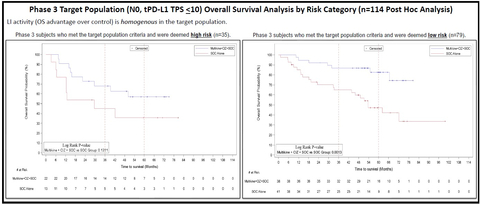CEL-SCI’s Multikine® Increased 5-Year Survival Rate to 82.6% in Locally Advanced Resectable Head & Neck Cancer Patients Who Were Deemed to be in the Treatment Group for Surgery and Radiation
-
5-year survival rate of 82.6% and 73% reduction in overall risk of death (hazard ratio of 0.27) are the strongest Multikine efficacy results reported to date, reflecting results in patients who met the
CEL-SCI - Data provide further evidence that the selection criteria for CEL-SCI’s upcoming confirmatory Registration Study may yield improved clinical outcomes
- Future advances in diagnostic technologies that improve patient selection, such as PET scans (which will be used in the confirmatory study), may further optimize patient selection and Multikine’s already strong efficacy results from the current 5-year Overall Survival at 73% up into the 82% range
- Clear unmet need: the 5-year survival rate remains below 50% in locally advanced resectable head and neck cancer patients who receive standard of care only
This press release features multimedia. View the full release here: https://www.businesswire.com/news/home/20240916023296/en/

CEL-SCI’s Multikine® Increases Head and Neck Cancer 5-Year Survival Rate to 82.6%. The graph on the right side (n=79) demonstrates that the target low risk population had a 5-year survival rate of 82.6% when treated with Multikine (n=38) vs. 47.3% when treated with standard of care alone (n=41). (Graphic: Business Wire)
Summary of Phase 3 Study: Multikine-treated patients who were recommended treatment of surgery and radiotherapy had a nearly 4-year survival benefit over control group
As previously reported, CEL-SCI’s completed Phase 3 study of 923 patients showed that newly diagnosed head and neck cancer patients who were deemed at low risk for recurrence after surgery (and therefore recommended to receive only radiotherapy after surgery) had a median overall survival (OS) benefit of 46.5-months, almost 4-years, over control patients. However, patients who were deemed to be high risk for recurrence after surgery (and therefore recommended to have chemotherapy added to the radiotherapy after surgery) showed no survival benefit.
Upcoming FDA Confirmatory Registration Study
Since the completed Phase 3 study showed clear survival benefit for some, but not all of the patients, the FDA requested that
Summary of New Data Presented at ESMO
The new data presented at ESMO includes a further analysis of the 114 patients in the completed Phase 3 study who met these target population selection criteria and form the basis for the confirmatory study. Specifically, the new analysis focused on those patients who were deemed low risk for recurrence (recommended to be given only radiotherapy – but no chemotherapy, per National Comprehensive Cancer Network “NCCN” guidelines) following surgery (n=79) as opposed to the selected patients who were deemed high risk for recurrence and who were recommended to have chemotherapy added to their treatment following surgery per the same guidelines (n=35).
While the overall survival benefit was clear and statistically significant (log rank p=0.0015) for the entire target population (n=114), the 79 patients who were recommended to receive only radiotherapy benefited to an even greater degree from pre-surgery treatment with Multikine than the group of 114 as a whole. This target low risk population (n=38) had a 5-year overall survival of 82.6% when treated with Multikine vs. 47.3% when treated with standard of care alone (n=41), without overlap in their respective 95% confidence intervals. More recent analysis for the target low risk population (n=79) showed a hazard ratio of 0.27 (95% CI [0.12, 0.64], Wald p=0.0027) achieving a 73% reduction in overall risk of death.
Management Commentary
“The additional data presented this weekend at ESMO 2024 provides further evidence that we have identified the target population that has the greatest survival benefit from Multikine, and that our study criteria can select for these patients upon diagnosis, before surgery,” stated
CEL-SCI’s CSO
The data were presented at ESMO 2024 by the study’s co-author József Tímár MD, PhD, DSc, Professor
About
Multikine (Leukocyte Interleukin, Injection), a true first-line cancer therapy, has been dosed in over 740 patients and received Orphan Drug designation from the FDA for neoadjuvant therapy in patients with squamous cell carcinoma (cancer) of the head and neck. Based on the very strong data from the completed randomized controlled Phase 3 study, the FDA agreed to CEL-SCI’s target patient selection criteria and gave the go-ahead to conduct a small, focused, confirmatory Registration Study which will enroll 212 patients.
The Company has operations in
Forward-Looking Statements
This press release contains forward-looking statements within the meaning of Section 27A of the Securities Act of 1933, as amended, and Section 21E of the Securities Exchange Act of 1934, as amended. When used in this press release, the words "intends," "believes," "anticipated," "plans" and "expects," and similar expressions, are intended to identify forward-looking statements. Such statements are subject to risks and uncertainties that could cause actual results to differ materially from those projected. Factors that could cause or contribute to such differences include an inability to duplicate the clinical results demonstrated in clinical studies, timely development of any potential products that can be shown to be safe and effective, receiving necessary regulatory approvals, difficulties in manufacturing any of the Company's potential products, inability to raise the necessary capital and the risk factors set forth from time to time in
* Multikine (Leukocyte Interleukin, Injection) is the trademark that
View source version on businesswire.com: https://www.businesswire.com/news/home/20240916023296/en/
(703) 506-9460
Source:
